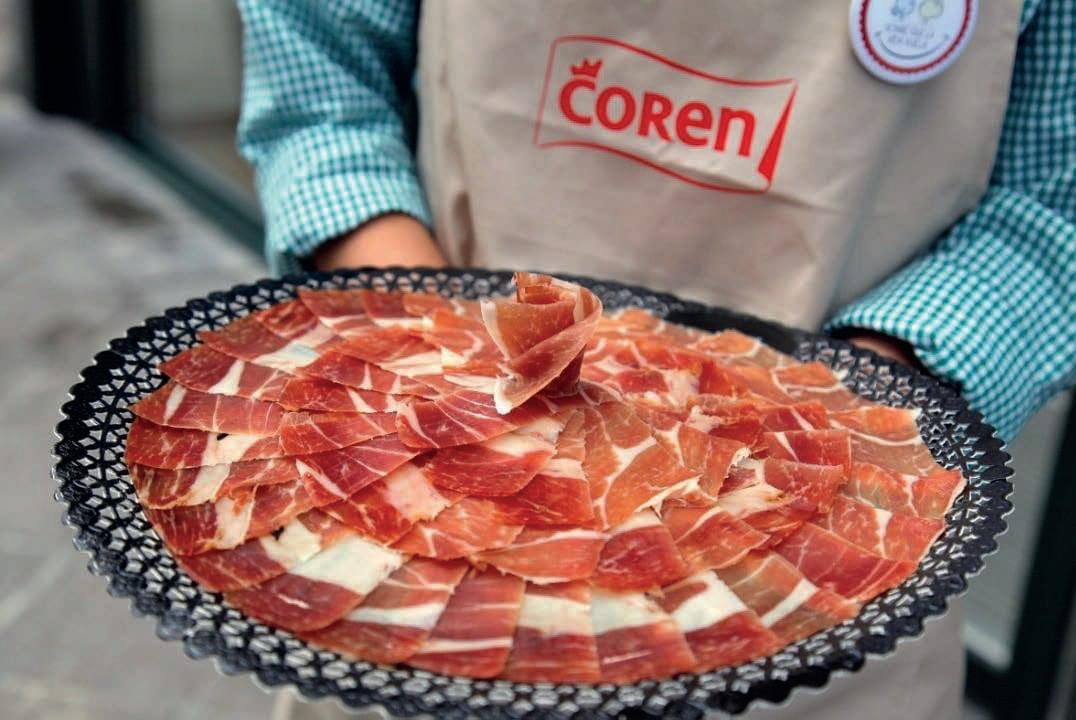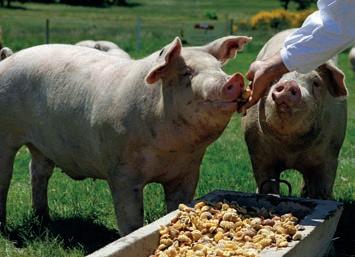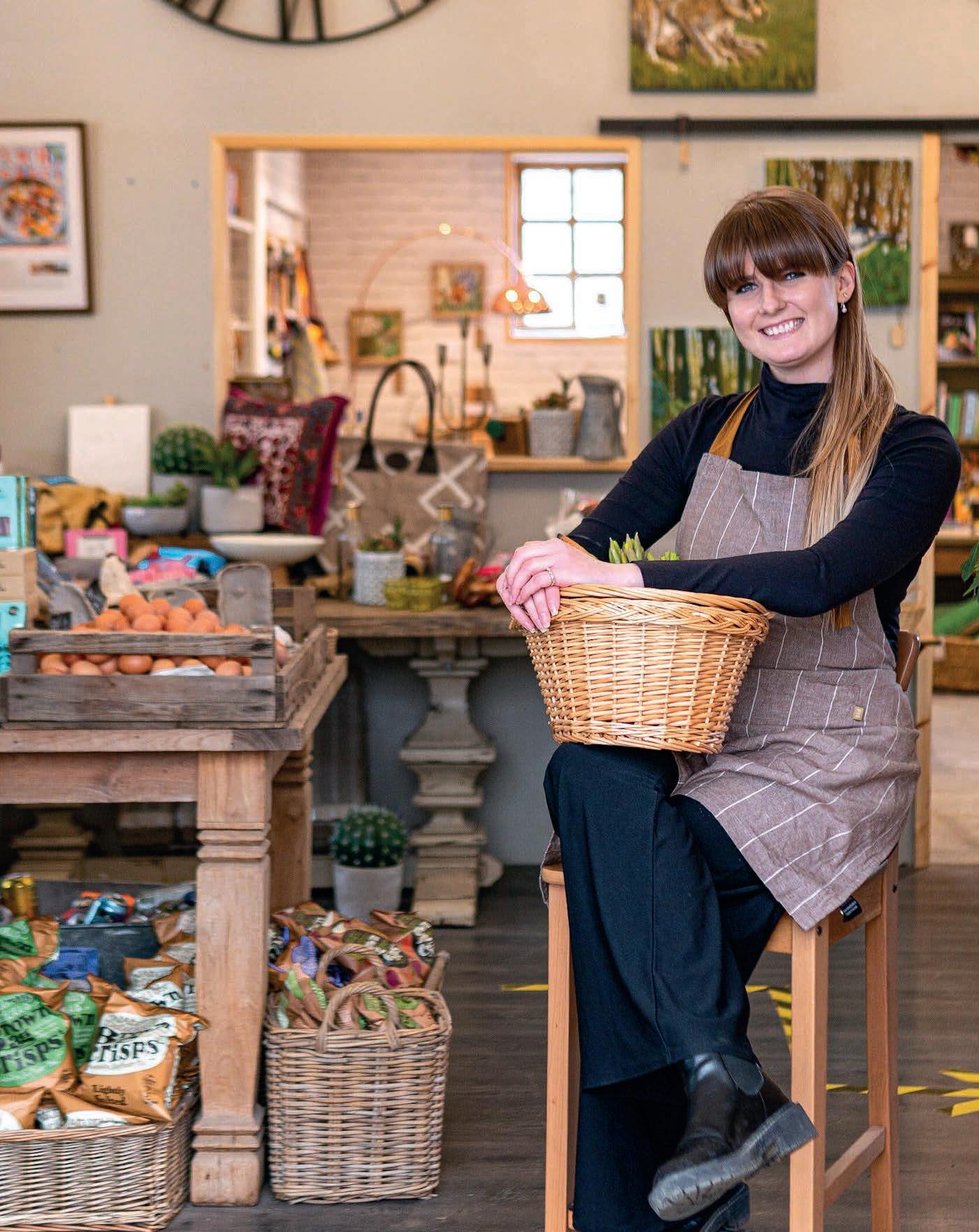
3 minute read
CHARCUTERIE
from FFD April 2021

Jamon with a difference
Rather than acorns, the pigs of Galicia are o en fed chestnuts. The result is the range of Selecta hams from Coren, which is now looking to gain a foothold in the UK market.
By Lauren Phillips
NESTLED IN SPAIN’S most north-western corner just above Portugal, Galicia is more famously associated with seafood than charcuterie. But, inland from its Atlantic coastline, this region also boasts rolling green hills and leafy forests that are home to pigs and an abundance of chestnuts for them to dine on.
The meat from the pigs is processed and cured for 18-24 months to become the Coren brand’s Selecta range of chestnut-fed ham and is already exported to over 40 countries.
Selecta’s pre-sliced retail packs launched in the UK two years ago as an alternative to the well-known Spanish hams of Jamon Iberico and Serrano. The brand has already picked up listings in Harrods, Fortnum & Mason, Brindisa, and Whole Foods Market, as well as other delis in London. Now, Coren – a producer cooperative – is looking to expand into the wider UK market.
Unlike the acorn-fed pigs of Jamon Iberico de Bellota, Coren rears its pigs exclusively on a diet of Galician chestnuts (the only company in the world to do so), due to a readily available supply.
“Chestnuts are a huge part of the culture in Galicia and at Coren we are always trying to develop di erent products, so we thought, ‘instead of acorns, why not try them?’” says Teresa Gómez-Franqueira, UK sales & business director and granddaughter of Coren CEO Manuel Gómez-Franqueira Alvarez – who founded the Galician cooperative in 1959.
Aside from adding value to agriculture in the region (Coren has a contract to purchase the entire Galician chestnut harvest), feeding chestnuts to the pigs gives the meat a milder and sweeter avour compared to other Spanish hams.
It is also intensely marbled and succulent due to the particular breed of pig chosen. “It is a special breed selected by Coren,” says GómezFranqueira. “We use it because it results in meat with a greater in ltration of fat, reminding the customer of Japanese Kobe beef.”
This combination of sweetness and succulence was recognised in last year’s Great Taste, where Coren picked up two-star awards for both its Gran Reserva Paleta and Gran Reserva Boneless Ham. It also received a one-star for its Lacón and a one-star for its Sliced Ham.
But its USP is not only its taste. The products’ RRPs range between a reasonable £6-£6.75 for the 100g pack of ham and £5-£5.75 for the 80g pack shoulder, and with Spanish ham like Iberico varying in degrees of quality, Coren is pitching itself in the middle of the market in terms of quality and price.
“You have the 100% Iberico de Bellota at the very top, down to Iberico Cebo where the pigs are reared on fodder in intense farming,” says Gómez-Franqueira. “That is where Selecta comes in. We breed our pigs outdoors and they are fed in a natural way with chestnuts but the product is still competitively priced, so it’s a good point of di erence for retailers.”
The Selecta range is available to UK retailers directly from Coren or through Brindisa.
Following a tricky start launching into the UK during the uncertainty of Brexit and then the pandemic closing down much of the market, the Spanish company is looking ahead at the future of importing into the UK.
Coren is planning to introduce its chestnutfed chorizo to the UK market this year and hopes to grow the brand in the hospitality and foodservice sector, supplying hotels and restaurants when restrictions begin to ease again.
coren.es
CROSS SECTION
Selecta Gran Reserva Ham
1
2
The hams are cured for a minimum of 18 months in drying barns located in Lugo. The curing process, which begins in winter and ends in autumn, is carefully controlled to ensure the temperature and humidity conditions.
Galician chestnuts are collected in season, peeled, cooked and frozen to maintain their nutritional properties and make sure they are available all year round as feed for the pigs. The chestnut-based diet also creates higher levels of fatty acids, such as monounsaturated fats, and antioxidants in the meat. Animal welfare is a top priority for the company when rearing its Selecta pigs. To achieve the best flavour in the meat, the animals are free to roam, forage, play with toys (balls, teethers, etc) and listen to classical music to reduce their levels of the stress hormone cortisol.







